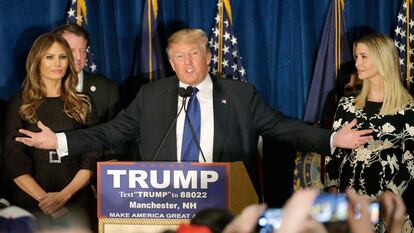Donald Trump and Bernie Sanders win New Hampshire primaries
Divisions among moderate Republicans helping strengthen magnate’s candidacy

Billionaire Donald Trump and socialist Senator Bernie Sanders achieved strong wins in their respective Republican and Democratic primaries in New Hampshire on Tuesday night.
After a lukewarm showing last week in the Iowa caucus, Trump secured his status as frontrunner in the Republican race, taking 35.1% of the vote.
His closest rival, Ohio Governor John Kasich, finished second with 15.9%, just ahead of Texas Senator Ted Cruz, who came in third with 11.6%.
Democratic voters in New Hampshire – where Sanders has strong support – gave him a comfortable win over Hiillary Clinton, awarding him 60% of the vote in comparison to his rival’s 38.4%.
“Together we are going to create an economy that works for all of us, not just the one percent”
“So you guys ready for a radical idea?” Sanders asked his supporters after the results were in. “Together we are going to create an economy that works for all of us, not just the one percent. And when millions of our people are working for starvation wages, yep, we're going to raise the minimum wage to 15 bucks an hour. And we are going to bring pay equity for women.”
For his part, Trump displayed his typical combative style. “The world is going to respect us again. Believe me,” he said, while pledging to create more jobs, end the heroin epidemic, win the trade wars with Japan, China and Mexico, and destroy Islamic State (ISIS).
Tuesday night’s results were victories for two different politicians.
Trump and Sanders have little in common in terms of ideology, but they have both been able to capitalize on the discontent many American have for the status quo.
The results in New Hampshire – a tiny New England state of 1.3 million residents – are a reflection of how the 2016 race for the White House has broken with tradition.
The mainstream candidates from the Democratic and Republican parties have been unable to stop unorthodox contenders such as Trump and Sanders.
“The world is going to respect us again. Believe me”
A year ago, no one would have believed that Trump – real estate mogul, casino owner, reality TV star and prone to hurling xenophobic insults – would have been able to win in New Hampshire.
But while Trump’s victory now comes as no surprise, it could be an indication that the rules of the past are no longer valid in American politics.
The New Hampshire result will not close the gap between the Republican establishment and the party’s insurgent wing, led by Trump. The problem is that there are too many candidates who are preferred by the Republican elite. They are the ones who usually win the nomination, but the number of names is dividing the vote.
Trump is confident that he will consolidate his position as Republican frontrunner when he goes on to the South Carolina primary on February 20 and then the Nevada precinct caucuses three days later.
The last time Clinton faced a primary was in 2008 when she won New Hampshire after losing in Iowa. But the Democratic nomination eventually went to Barack Obama.
This time round the reverse has happened. Last week, the former Secretary of State narrowly beat Sanders in Iowa but lost in New Hampshire, and now sits second in the race. But across the country, she is viewed as most Democrats’ favorite.
The mainstream candidates have not been able to stop the unorthodox contenders, such as Trump and Sanders.
New Hampshire is Sanders’ stomping ground – he represents the neighboring state of Vermont in the US Senate.
The Brooklyn-born politician’s campaign has made significant advances in the past few months, winning more support from America’s middle classes and younger voters.
Still, Sanders’ stance against the big banks and Wall Street while favoring free healthcare and education makes the senator an unorthodox candidate.
In the United States, where socialism is still linked with communism, Sanders has now clarified to voters that he is a “socialist democratic,” or in other words, a social democrat.
But as the campaigns move south and then west, Clinton will most likely gain ground.
The Democrats will choose their candidate in Nevada on February 20 and then in South Carolina on February 27.
English version by Martin Delfín.
Tu suscripción se está usando en otro dispositivo
¿Quieres añadir otro usuario a tu suscripción?
Si continúas leyendo en este dispositivo, no se podrá leer en el otro.
FlechaTu suscripción se está usando en otro dispositivo y solo puedes acceder a EL PAÍS desde un dispositivo a la vez.
Si quieres compartir tu cuenta, cambia tu suscripción a la modalidad Premium, así podrás añadir otro usuario. Cada uno accederá con su propia cuenta de email, lo que os permitirá personalizar vuestra experiencia en EL PAÍS.
¿Tienes una suscripción de empresa? Accede aquí para contratar más cuentas.
En el caso de no saber quién está usando tu cuenta, te recomendamos cambiar tu contraseña aquí.
Si decides continuar compartiendo tu cuenta, este mensaje se mostrará en tu dispositivo y en el de la otra persona que está usando tu cuenta de forma indefinida, afectando a tu experiencia de lectura. Puedes consultar aquí los términos y condiciones de la suscripción digital.








































